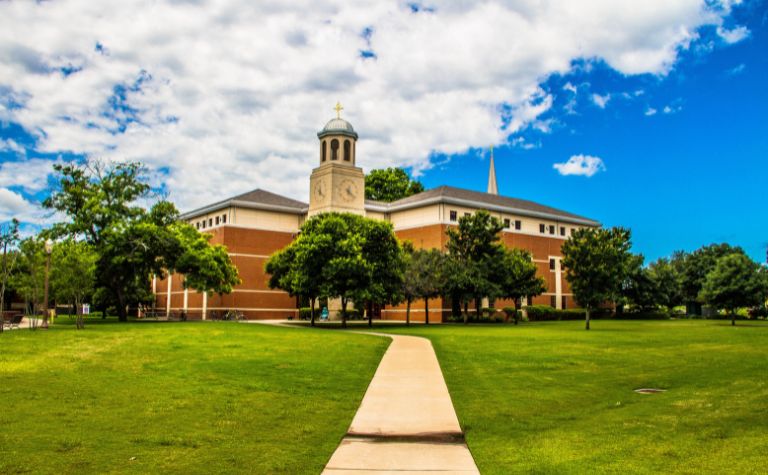The realm of Christianity encompasses a vast array of institutions dedicated to studying, practicing, and disseminating its teachings.
One such critical institution is the seminary.
At its core, a seminary in Christianity is an educational establishment where individuals receive training to serve as leaders within the Christian church, whether as pastors, priests, or ministers.
Through rigorous academic studies, practical ministry training, and spiritual development, these institutions prepare individuals to lead congregations, offer pastoral care, and engage with broader societal issues through a Christian lens.
This article will provide an overview of the Christian seminary, its origins, purposes, and its significance in the larger Christian landscape.

When Did Seminaries Start?
The foundation of Christian seminaries traces back to the early days of Christianity.
Understanding this history offers a glimpse into how these institutions have evolved and their pivotal role in shaping the Christian church.
Early Christian Training: In the initial centuries after Christ’s death and resurrection, training for Christian leadership was informal.
Aspiring leaders typically learned through apprenticeships, where they would work closely with an experienced leader or elder in the church, absorbing teachings, traditions, and pastoral practices.
Formation of Catechetical Schools: By the 2nd and 3rd centuries, as Christianity grew and spread, there was a need for more structured education.
This led to the formation of catechetical schools, particularly in key cities like Alexandria and Antioch.
These schools primarily focused on instructing new converts but became centers for deeper theological study.
Monastic and Cathedral Schools: The rise of monasticism in the 4th and 5th centuries saw the establishment of monastic schools.
Monasteries became crucial centers of learning, where monks would both study and produce manuscripts.
Parallelly, cathedral schools emerged in the medieval period, attached to cathedrals and offering broader curricula that included theology.
Establishment of Modern Seminaries: In response to the Protestant Reformation, the Council of Trent (1545-1563) mandated the creation of seminaries to ensure clergy were well-trained in theology and pastoral care.
This marked a significant shift towards the establishment of seminaries as standalone institutions dedicated to preparing individuals for church leadership.
Expansion and Diversification: With the advent of the modern era, seminaries expanded and diversified in their offerings.
Protestant denominations developed their own seminaries to train ministers in their distinct theological traditions.
Theological education became more formalized, encompassing a wider range of disciplines and offering degrees in divinity and theology.
Global Reach: As Christianity spread globally, seminaries were established in various parts of the world, adapting to local cultures and contexts while maintaining core Christian teachings.

What’s the Purpose of Seminary?
Seminaries stand as pivotal institutions within the Christian tradition, dedicated to cultivating the next generation of leaders for the church.
Their purposes and goals, while multifaceted, can be distilled into a few key points:
Theological Education:
- Central to the seminary experience is a robust education in theology. Students engage with core Christian doctrines, study the Bible in depth, and explore the history of Christianity, ensuring they have a solid foundation upon which to base their future ministry.
Practical Ministry Training:
- Beyond theoretical knowledge, seminaries prioritize the practical aspects of ministry. This includes courses and experiences in preaching, pastoral care, and administration, equipping students to effectively lead congregations and handle the various challenges they might face in their roles.
Spiritual Formation:
- A seminary isn’t just an academic institution; it’s also a place for personal spiritual growth. Through communal worship, prayer, and reflection, students are encouraged to deepen their relationship with God and clarify their calling to serve.
Leadership Development:
- Given that many seminary graduates will assume leadership roles, there’s a strong emphasis on cultivating leadership skills. This encompasses not just leading worship services, but also managing church operations, guiding congregations through change, and representing the church in broader community settings.
Engagement with Contemporary Issues:
- Modern seminaries recognize the need for church leaders to be well-versed in current societal and global issues. Therefore, they often incorporate discussions on topics like ethics, social justice, and cultural engagement, preparing graduates to address these matters from a Christian perspective.
Interdisciplinary Study:
- Recognizing the interconnectedness of various disciplines, many seminaries offer courses that merge theology with fields like psychology, sociology, or even arts. This holistic approach ensures that students can engage with diverse audiences and contexts once they embark on their ministerial journey.
Community Building:
- Seminaries foster a strong sense of community among students. This provides a support system during their studies and offers a network of peers and mentors they can rely on throughout their careers.

What are the Different Types of Seminaries?
Christian seminaries, though united in their fundamental aim of preparing individuals for leadership roles within the church, come in various forms.
Understanding these types helps in discerning which might be best suited for an individual’s unique goals and calling. Here are the primary types of Christian seminaries:
Divinity Schools:
- Often affiliated with larger universities, divinity schools offer broad theological education and tend to have a diverse student body from multiple denominations. Their comprehensive curricula often accommodate both religious and secular subjects, allowing for interdisciplinary study.
Bible Colleges:
- These institutions emphasize a deep study of the Bible and typically offer undergraduate programs. While they prepare students for ministry, they also cater to those wanting to pursue Christian education, missions, or other related fields.
Theological Seminaries:
- These are graduate institutions with a primary focus on theology, pastoral training, and ministry preparation. They can be denominational (catering to a specific Christian tradition) or non-denominational (welcoming students from various Christian backgrounds).
Monastic Seminaries:
- Rooted in monastic traditions, these seminaries combine theological education with monastic life practices, such as communal living, regular prayer, and specific spiritual disciplines. They’re typically linked to a particular monastic order or community.
Online Seminaries:
- With advancements in technology, there’s been a rise in fully online seminary programs. These offer flexibility, allowing students to pursue theological education without relocating. They provide a combination of online lectures, virtual community engagement, and sometimes require short on-campus residencies.
Evangelical and Pentecostal Seminaries:
- Catering specifically to the Evangelical and Pentecostal traditions, these seminaries emphasize personal conversion, the authority of the Bible, and often charismatic practices. Their curriculum is tailored to align closely with these theological standpoints.
Ecumenical or Interdenominational Seminaries:
- These institutions welcome students from various Christian denominations, promoting dialogue and understanding among different Christian traditions. The curriculum is designed to offer a broad view of Christian theology while allowing for specialization in particular denominational teachings.
What Do Students Learn at Seminary?
A seminary’s curriculum is crafted to ensure students receive a comprehensive education, combining academic rigor, practical training, and spiritual development.
Though specifics can vary based on the type of seminary and its denominational affiliation, there are core elements commonly found in most seminary programs:
Core Theological Courses:
- Biblical Studies: An in-depth exploration of the Old and New Testaments, including their historical contexts, literary structures, and theological themes.
- Systematic Theology: A study of Christian doctrines, such as the nature of God, Christology, soteriology, and eschatology.
- Church History: An examination of the Christian church’s evolution, from its early beginnings to modern times, highlighting key figures, events, and movements.
Practical Ministry Courses:
- Pastoral Care: Training in providing spiritual and emotional support to individuals and communities, often including counseling techniques.
- Homiletics: The art of preaching, where students learn to craft and deliver sermons effectively.
- Liturgical Studies: A study of Christian worship practices, rituals, and sacraments, often tailored to specific denominations.
Mission and Evangelism: Courses that equip students to spread the Christian message, both locally and globally, focusing on techniques, cultural considerations, and contemporary challenges.
Ethics: Exploring moral questions and dilemmas individuals and societies face from a Christian perspective, guiding students in applying theological principles to real-world situations.
Languages: Many seminaries require or offer courses in biblical languages, such as Hebrew and Greek, enabling students to engage with biblical texts in their original languages.
Interdisciplinary Studies: Courses that intersect theology with other fields, like arts, social sciences, or even technology, fostering a holistic understanding of contemporary challenges and opportunities.
Internships and Field Education: Practical experiences in churches, missions, or Christian organizations, allowing students to apply their knowledge in real-world settings and gain practical experience.
Spiritual Formation: Opportunities for personal spiritual growth, including retreats, meditation sessions, and communal worship, emphasizing the importance of personal spirituality in ministry.
Specializations: Depending on the seminary, students might have the opportunity to specialize in areas like youth ministry, chaplaincy, Christian counseling, or church planting.
Capstone Projects or Theses: In some advanced programs, students might be required to complete a research project or thesis, allowing them to delve deeply into a particular theological or ministerial topic.
The goal of a seminary’s curriculum and programs is to produce graduates who are knowledgeable, skilled, and spiritually grounded.
This diverse range of courses and experiences prepares students to serve effectively in various roles within the Christian church and broader society.
What is Seminary Like?
The life inside a Christian seminary is a blend of academic rigor, spiritual development, and community engagement.
While each seminary has its unique culture and rhythm, there are common experiences that define life within these institutions:
Academic Endeavors:
- Students spend significant time attending lectures, participating in class discussions, and engaging in independent study. Libraries become familiar spaces, and evenings are often dedicated to reading assignments, research, and preparing for examinations.
Spiritual Activities:
- Daily or weekly chapel services are common in many seminaries, offering students a chance to worship, reflect, and grow spiritually. Prayer groups, Bible studies, and meditation sessions are integral to the spiritual life on campus.
Community Living:
- Many seminaries offer on-campus housing, fostering a close-knit community. Living alongside peers provides deep friendships, mutual support, and shared learning opportunities.
Practical Ministry Training:
- Students often engage in practical ministry assignments, which might include preaching at local churches, conducting Bible classes, or offering pastoral care in various settings.
Extracurricular Activities:
- Seminaries often host guest lecturers, workshops, and conferences, enabling students to hear from established theologians, authors, or ministry leaders. Additionally, students might participate in choir, sports, or join clubs based on their interests.
Outreach and Missions:
- Many seminaries emphasize outreach activities, encouraging students to engage with the local community or even participate in short-term mission trips. These experiences allow students to apply their knowledge and skills in diverse settings.
Diversity and Dialogue:
- Many seminaries attract students from various backgrounds and cultures, so there’s a rich diversity on campuses. This diversity leads to enriching dialogues, exposing students to different perspectives and traditions within Christianity.
Mentorship and Guidance:
- Faculty members and seasoned ministers often serve as mentors, guiding students in their academic journey and helping them discern their calling. Regular meetings, discussions, and feedback sessions with mentors are pivotal in student growth.
Personal Growth Challenges:
- Balancing academic pressures, personal spiritual growth, and community engagements can be challenging. It’s not uncommon for students to face periods of doubt, discernment, and self-reflection as they navigate their vocation and beliefs.
Preparation for the Future:
- As graduation approaches, there’s a palpable anticipation. Students seek guidance on potential pastoral roles, further academic pursuits, or other ministry opportunities. Seminaries often offer career counseling, job placement services, and networking events to aid this transition.
Recent Posts
David Jeremiah, a renowned pastor, author, and speaker, has captivated the hearts of many with his compelling sermons. His messages resonate deeply with diverse audiences, leaving an enduring...
Tim Keller, a distinguished pastor, theologian, and author, has garnered a devoted following through the profound impact of his sermons. In this article, we will explore seven compelling reasons...
